Reflective Learning: Gibbs Model Application in Higher Education
VerifiedAdded on 2023/06/11
|9
|1954
|107
Essay
AI Summary
This essay evaluates reflective learning methodologies, particularly in the context of higher education, with the aim of improving learning outcomes. It employs Gibbs' reflective cycle model to analyze the processes of description, feelings, evaluation, analysis, conclusion, and action plan in reflective practice. The essay also explores the roles of feedback and feed-forward, assessing how they can be integrated using the Gibbs model to enhance learning. Furthermore, it examines how a reflective approach can inform and improve future formative and summative assessments, ultimately contributing to better educational results. The reflective approach is helpful for learners, especially in higher education, where it can help students achieve success and eliminate potential challenges.
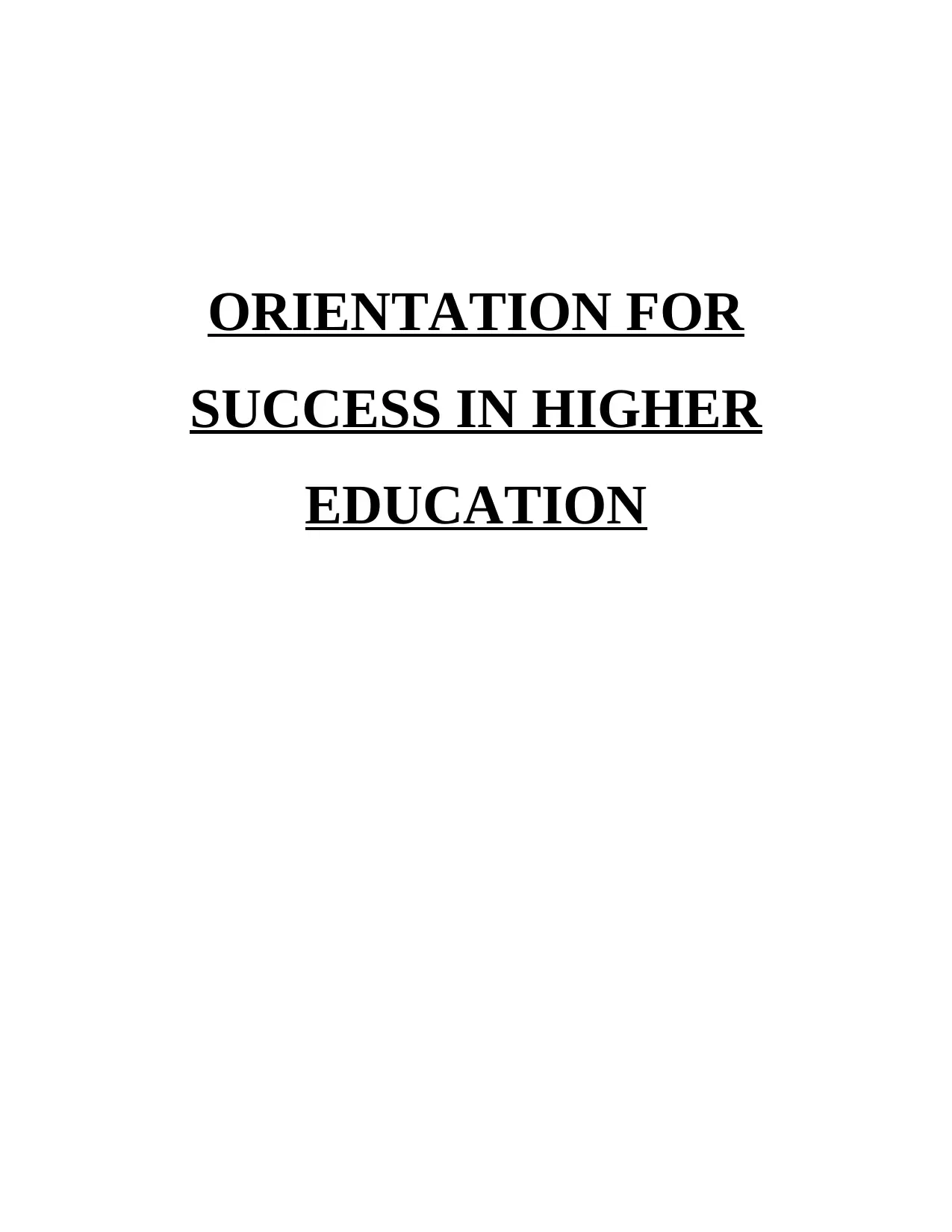
ORIENTATION FOR
SUCCESS IN HIGHER
EDUCATION
SUCCESS IN HIGHER
EDUCATION
Paraphrase This Document
Need a fresh take? Get an instant paraphrase of this document with our AI Paraphraser
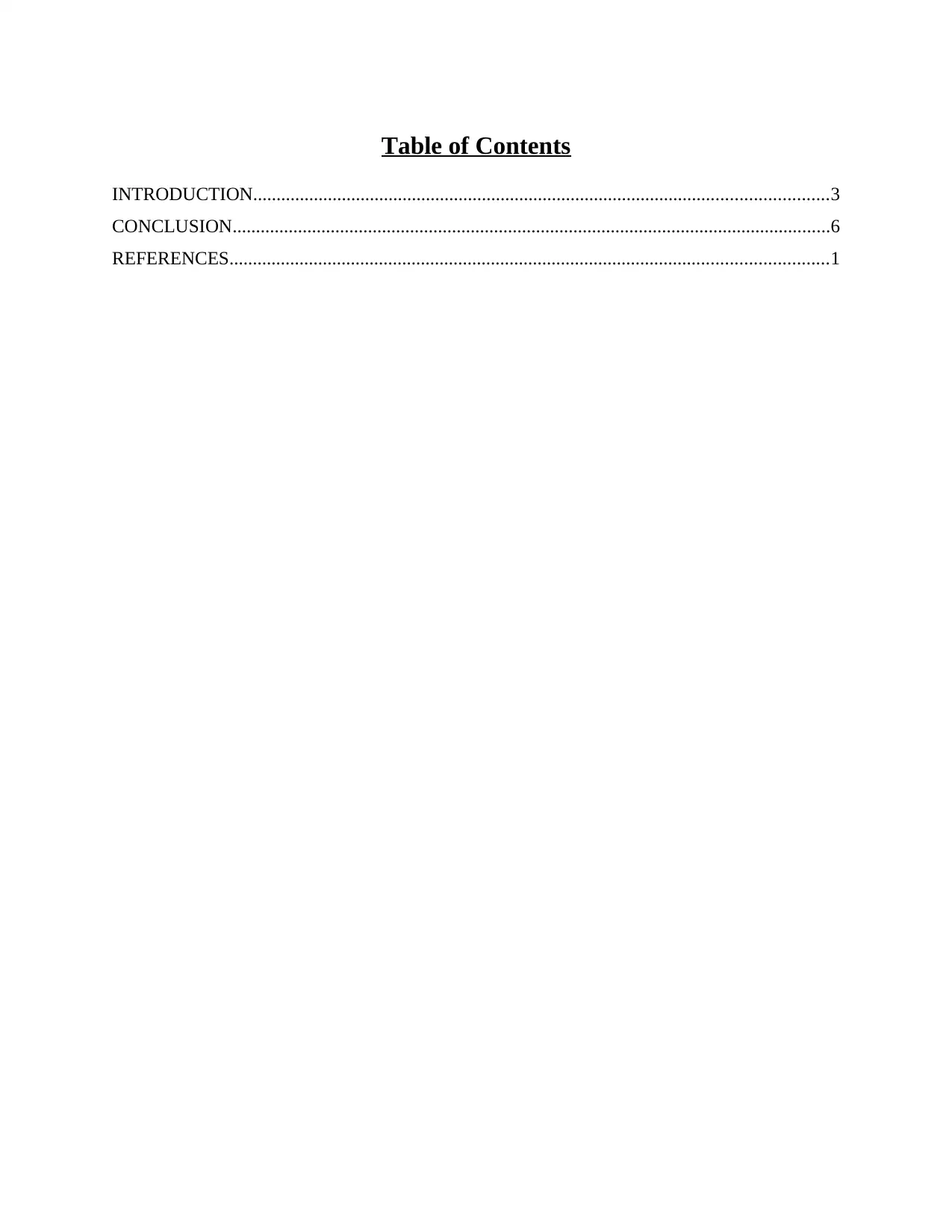
Table of Contents
INTRODUCTION...........................................................................................................................3
CONCLUSION................................................................................................................................6
REFERENCES................................................................................................................................1
INTRODUCTION...........................................................................................................................3
CONCLUSION................................................................................................................................6
REFERENCES................................................................................................................................1
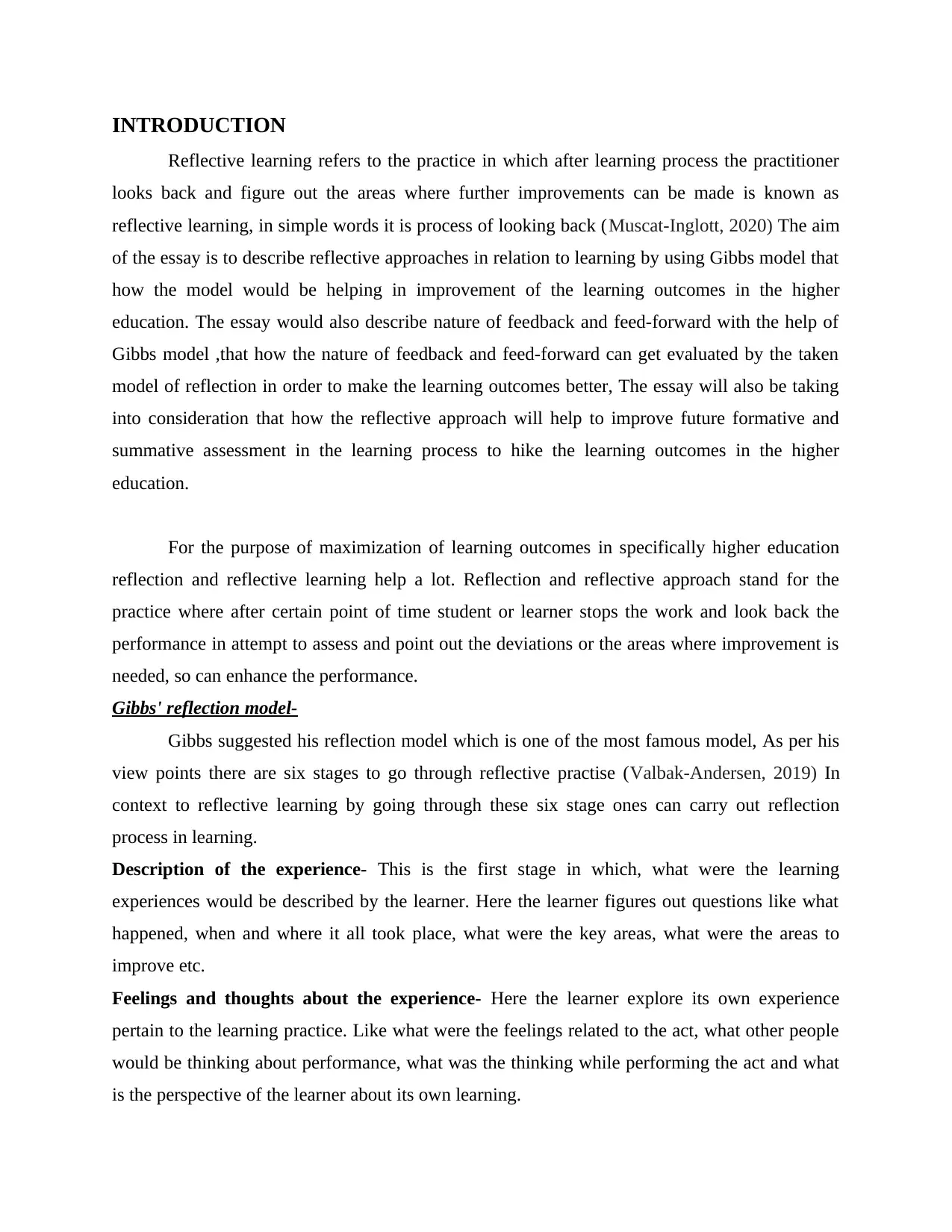
INTRODUCTION
Reflective learning refers to the practice in which after learning process the practitioner
looks back and figure out the areas where further improvements can be made is known as
reflective learning, in simple words it is process of looking back (Muscat-Inglott, 2020) The aim
of the essay is to describe reflective approaches in relation to learning by using Gibbs model that
how the model would be helping in improvement of the learning outcomes in the higher
education. The essay would also describe nature of feedback and feed-forward with the help of
Gibbs model ,that how the nature of feedback and feed-forward can get evaluated by the taken
model of reflection in order to make the learning outcomes better, The essay will also be taking
into consideration that how the reflective approach will help to improve future formative and
summative assessment in the learning process to hike the learning outcomes in the higher
education.
For the purpose of maximization of learning outcomes in specifically higher education
reflection and reflective learning help a lot. Reflection and reflective approach stand for the
practice where after certain point of time student or learner stops the work and look back the
performance in attempt to assess and point out the deviations or the areas where improvement is
needed, so can enhance the performance.
Gibbs' reflection model-
Gibbs suggested his reflection model which is one of the most famous model, As per his
view points there are six stages to go through reflective practise (Valbak-Andersen, 2019) In
context to reflective learning by going through these six stage ones can carry out reflection
process in learning.
Description of the experience- This is the first stage in which, what were the learning
experiences would be described by the learner. Here the learner figures out questions like what
happened, when and where it all took place, what were the key areas, what were the areas to
improve etc.
Feelings and thoughts about the experience- Here the learner explore its own experience
pertain to the learning practice. Like what were the feelings related to the act, what other people
would be thinking about performance, what was the thinking while performing the act and what
is the perspective of the learner about its own learning.
Reflective learning refers to the practice in which after learning process the practitioner
looks back and figure out the areas where further improvements can be made is known as
reflective learning, in simple words it is process of looking back (Muscat-Inglott, 2020) The aim
of the essay is to describe reflective approaches in relation to learning by using Gibbs model that
how the model would be helping in improvement of the learning outcomes in the higher
education. The essay would also describe nature of feedback and feed-forward with the help of
Gibbs model ,that how the nature of feedback and feed-forward can get evaluated by the taken
model of reflection in order to make the learning outcomes better, The essay will also be taking
into consideration that how the reflective approach will help to improve future formative and
summative assessment in the learning process to hike the learning outcomes in the higher
education.
For the purpose of maximization of learning outcomes in specifically higher education
reflection and reflective learning help a lot. Reflection and reflective approach stand for the
practice where after certain point of time student or learner stops the work and look back the
performance in attempt to assess and point out the deviations or the areas where improvement is
needed, so can enhance the performance.
Gibbs' reflection model-
Gibbs suggested his reflection model which is one of the most famous model, As per his
view points there are six stages to go through reflective practise (Valbak-Andersen, 2019) In
context to reflective learning by going through these six stage ones can carry out reflection
process in learning.
Description of the experience- This is the first stage in which, what were the learning
experiences would be described by the learner. Here the learner figures out questions like what
happened, when and where it all took place, what were the key areas, what were the areas to
improve etc.
Feelings and thoughts about the experience- Here the learner explore its own experience
pertain to the learning practice. Like what were the feelings related to the act, what other people
would be thinking about performance, what was the thinking while performing the act and what
is the perspective of the learner about its own learning.
⊘ This is a preview!⊘
Do you want full access?
Subscribe today to unlock all pages.

Trusted by 1+ million students worldwide
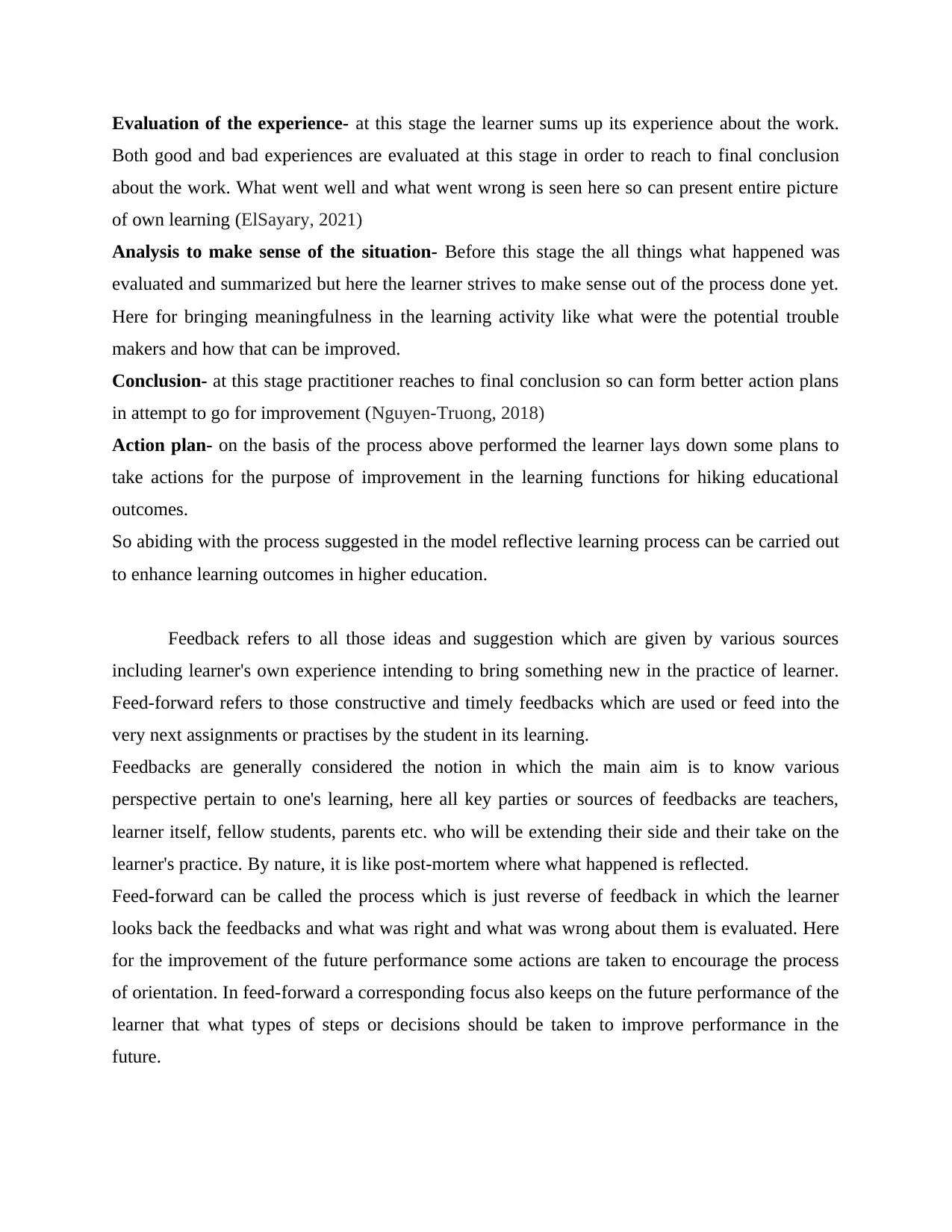
Evaluation of the experience- at this stage the learner sums up its experience about the work.
Both good and bad experiences are evaluated at this stage in order to reach to final conclusion
about the work. What went well and what went wrong is seen here so can present entire picture
of own learning (ElSayary, 2021)
Analysis to make sense of the situation- Before this stage the all things what happened was
evaluated and summarized but here the learner strives to make sense out of the process done yet.
Here for bringing meaningfulness in the learning activity like what were the potential trouble
makers and how that can be improved.
Conclusion- at this stage practitioner reaches to final conclusion so can form better action plans
in attempt to go for improvement (Nguyen-Truong, 2018)
Action plan- on the basis of the process above performed the learner lays down some plans to
take actions for the purpose of improvement in the learning functions for hiking educational
outcomes.
So abiding with the process suggested in the model reflective learning process can be carried out
to enhance learning outcomes in higher education.
Feedback refers to all those ideas and suggestion which are given by various sources
including learner's own experience intending to bring something new in the practice of learner.
Feed-forward refers to those constructive and timely feedbacks which are used or feed into the
very next assignments or practises by the student in its learning.
Feedbacks are generally considered the notion in which the main aim is to know various
perspective pertain to one's learning, here all key parties or sources of feedbacks are teachers,
learner itself, fellow students, parents etc. who will be extending their side and their take on the
learner's practice. By nature, it is like post-mortem where what happened is reflected.
Feed-forward can be called the process which is just reverse of feedback in which the learner
looks back the feedbacks and what was right and what was wrong about them is evaluated. Here
for the improvement of the future performance some actions are taken to encourage the process
of orientation. In feed-forward a corresponding focus also keeps on the future performance of the
learner that what types of steps or decisions should be taken to improve performance in the
future.
Both good and bad experiences are evaluated at this stage in order to reach to final conclusion
about the work. What went well and what went wrong is seen here so can present entire picture
of own learning (ElSayary, 2021)
Analysis to make sense of the situation- Before this stage the all things what happened was
evaluated and summarized but here the learner strives to make sense out of the process done yet.
Here for bringing meaningfulness in the learning activity like what were the potential trouble
makers and how that can be improved.
Conclusion- at this stage practitioner reaches to final conclusion so can form better action plans
in attempt to go for improvement (Nguyen-Truong, 2018)
Action plan- on the basis of the process above performed the learner lays down some plans to
take actions for the purpose of improvement in the learning functions for hiking educational
outcomes.
So abiding with the process suggested in the model reflective learning process can be carried out
to enhance learning outcomes in higher education.
Feedback refers to all those ideas and suggestion which are given by various sources
including learner's own experience intending to bring something new in the practice of learner.
Feed-forward refers to those constructive and timely feedbacks which are used or feed into the
very next assignments or practises by the student in its learning.
Feedbacks are generally considered the notion in which the main aim is to know various
perspective pertain to one's learning, here all key parties or sources of feedbacks are teachers,
learner itself, fellow students, parents etc. who will be extending their side and their take on the
learner's practice. By nature, it is like post-mortem where what happened is reflected.
Feed-forward can be called the process which is just reverse of feedback in which the learner
looks back the feedbacks and what was right and what was wrong about them is evaluated. Here
for the improvement of the future performance some actions are taken to encourage the process
of orientation. In feed-forward a corresponding focus also keeps on the future performance of the
learner that what types of steps or decisions should be taken to improve performance in the
future.
Paraphrase This Document
Need a fresh take? Get an instant paraphrase of this document with our AI Paraphraser
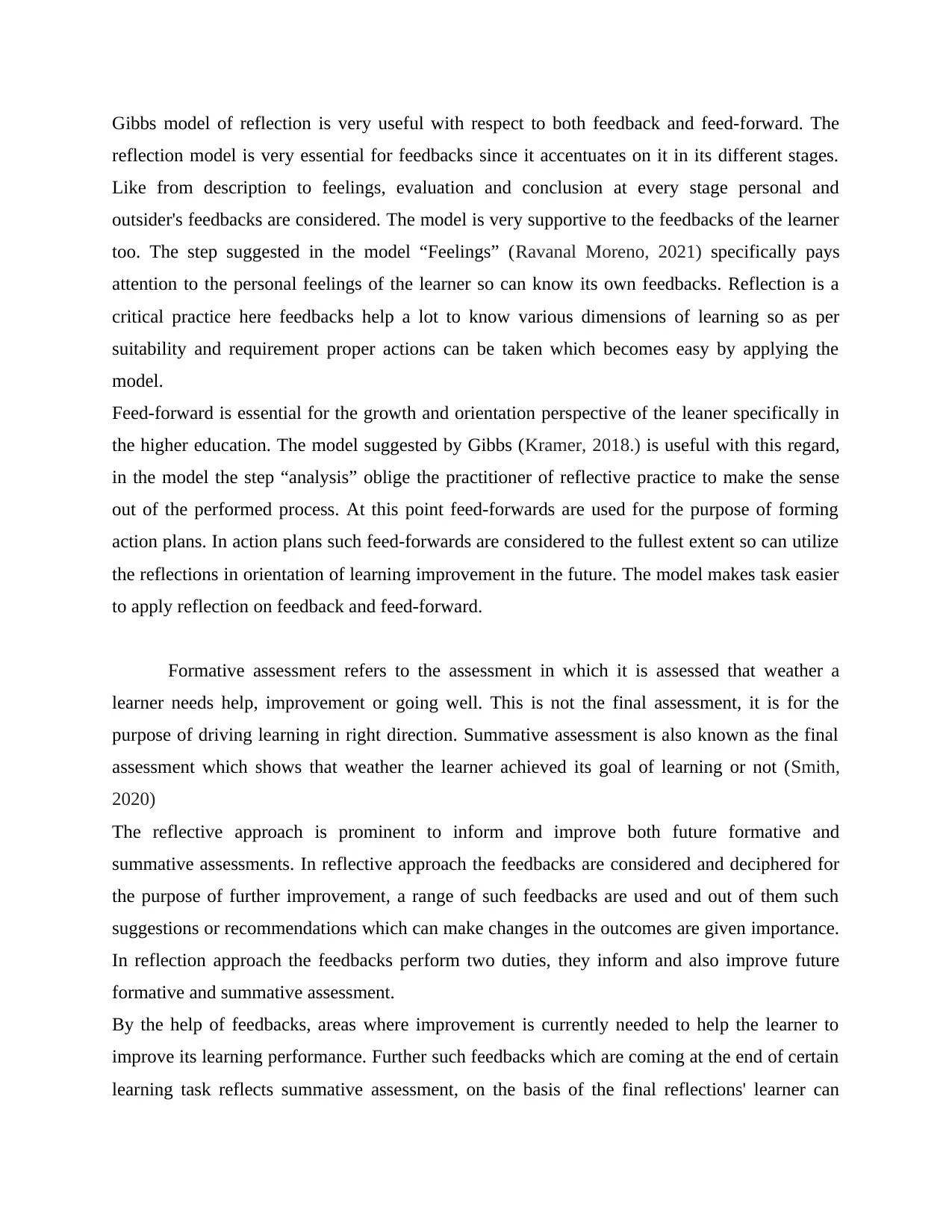
Gibbs model of reflection is very useful with respect to both feedback and feed-forward. The
reflection model is very essential for feedbacks since it accentuates on it in its different stages.
Like from description to feelings, evaluation and conclusion at every stage personal and
outsider's feedbacks are considered. The model is very supportive to the feedbacks of the learner
too. The step suggested in the model “Feelings” (Ravanal Moreno, 2021) specifically pays
attention to the personal feelings of the learner so can know its own feedbacks. Reflection is a
critical practice here feedbacks help a lot to know various dimensions of learning so as per
suitability and requirement proper actions can be taken which becomes easy by applying the
model.
Feed-forward is essential for the growth and orientation perspective of the leaner specifically in
the higher education. The model suggested by Gibbs (Kramer, 2018.) is useful with this regard,
in the model the step “analysis” oblige the practitioner of reflective practice to make the sense
out of the performed process. At this point feed-forwards are used for the purpose of forming
action plans. In action plans such feed-forwards are considered to the fullest extent so can utilize
the reflections in orientation of learning improvement in the future. The model makes task easier
to apply reflection on feedback and feed-forward.
Formative assessment refers to the assessment in which it is assessed that weather a
learner needs help, improvement or going well. This is not the final assessment, it is for the
purpose of driving learning in right direction. Summative assessment is also known as the final
assessment which shows that weather the learner achieved its goal of learning or not (Smith,
2020)
The reflective approach is prominent to inform and improve both future formative and
summative assessments. In reflective approach the feedbacks are considered and deciphered for
the purpose of further improvement, a range of such feedbacks are used and out of them such
suggestions or recommendations which can make changes in the outcomes are given importance.
In reflection approach the feedbacks perform two duties, they inform and also improve future
formative and summative assessment.
By the help of feedbacks, areas where improvement is currently needed to help the learner to
improve its learning performance. Further such feedbacks which are coming at the end of certain
learning task reflects summative assessment, on the basis of the final reflections' learner can
reflection model is very essential for feedbacks since it accentuates on it in its different stages.
Like from description to feelings, evaluation and conclusion at every stage personal and
outsider's feedbacks are considered. The model is very supportive to the feedbacks of the learner
too. The step suggested in the model “Feelings” (Ravanal Moreno, 2021) specifically pays
attention to the personal feelings of the learner so can know its own feedbacks. Reflection is a
critical practice here feedbacks help a lot to know various dimensions of learning so as per
suitability and requirement proper actions can be taken which becomes easy by applying the
model.
Feed-forward is essential for the growth and orientation perspective of the leaner specifically in
the higher education. The model suggested by Gibbs (Kramer, 2018.) is useful with this regard,
in the model the step “analysis” oblige the practitioner of reflective practice to make the sense
out of the performed process. At this point feed-forwards are used for the purpose of forming
action plans. In action plans such feed-forwards are considered to the fullest extent so can utilize
the reflections in orientation of learning improvement in the future. The model makes task easier
to apply reflection on feedback and feed-forward.
Formative assessment refers to the assessment in which it is assessed that weather a
learner needs help, improvement or going well. This is not the final assessment, it is for the
purpose of driving learning in right direction. Summative assessment is also known as the final
assessment which shows that weather the learner achieved its goal of learning or not (Smith,
2020)
The reflective approach is prominent to inform and improve both future formative and
summative assessments. In reflective approach the feedbacks are considered and deciphered for
the purpose of further improvement, a range of such feedbacks are used and out of them such
suggestions or recommendations which can make changes in the outcomes are given importance.
In reflection approach the feedbacks perform two duties, they inform and also improve future
formative and summative assessment.
By the help of feedbacks, areas where improvement is currently needed to help the learner to
improve its learning performance. Further such feedbacks which are coming at the end of certain
learning task reflects summative assessment, on the basis of the final reflections' learner can
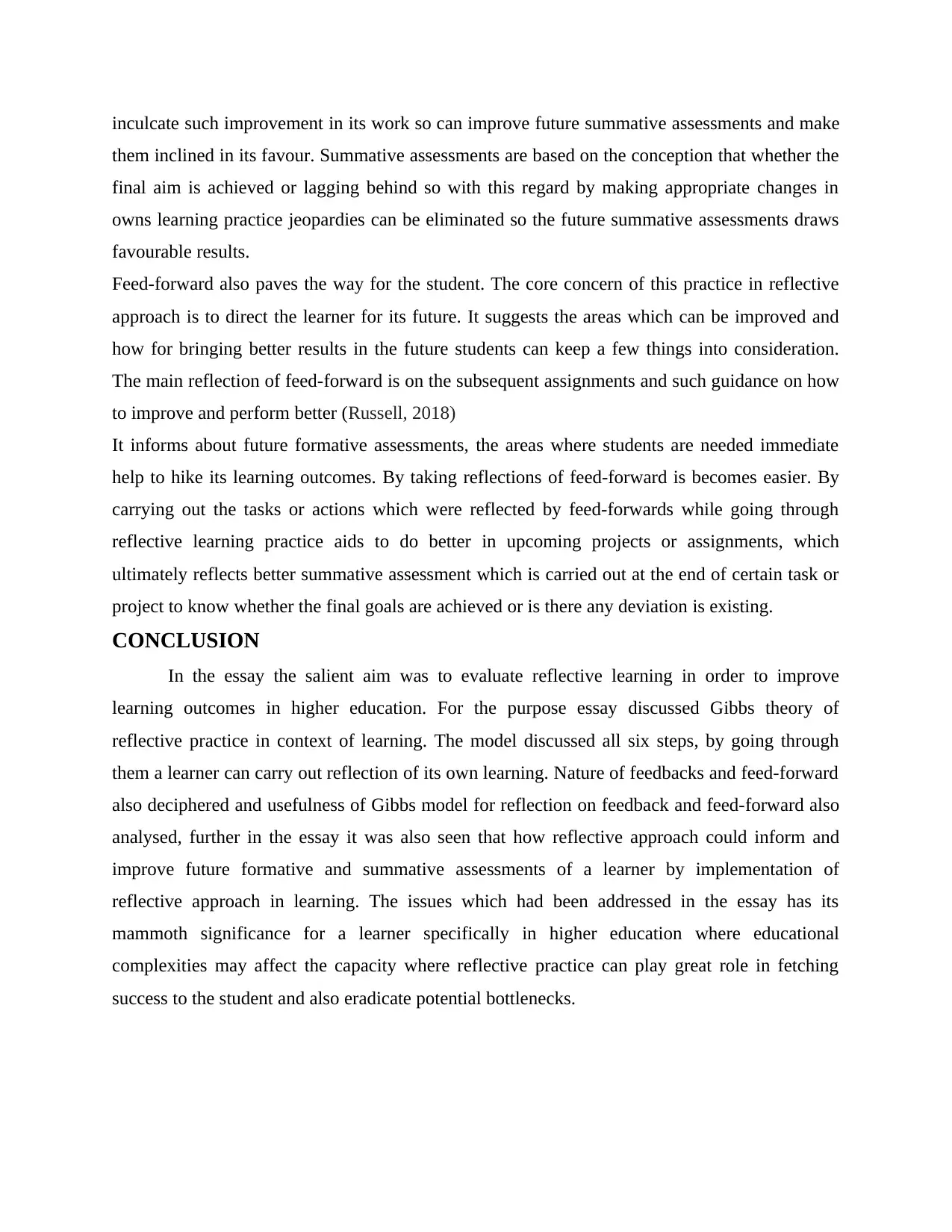
inculcate such improvement in its work so can improve future summative assessments and make
them inclined in its favour. Summative assessments are based on the conception that whether the
final aim is achieved or lagging behind so with this regard by making appropriate changes in
owns learning practice jeopardies can be eliminated so the future summative assessments draws
favourable results.
Feed-forward also paves the way for the student. The core concern of this practice in reflective
approach is to direct the learner for its future. It suggests the areas which can be improved and
how for bringing better results in the future students can keep a few things into consideration.
The main reflection of feed-forward is on the subsequent assignments and such guidance on how
to improve and perform better (Russell, 2018)
It informs about future formative assessments, the areas where students are needed immediate
help to hike its learning outcomes. By taking reflections of feed-forward is becomes easier. By
carrying out the tasks or actions which were reflected by feed-forwards while going through
reflective learning practice aids to do better in upcoming projects or assignments, which
ultimately reflects better summative assessment which is carried out at the end of certain task or
project to know whether the final goals are achieved or is there any deviation is existing.
CONCLUSION
In the essay the salient aim was to evaluate reflective learning in order to improve
learning outcomes in higher education. For the purpose essay discussed Gibbs theory of
reflective practice in context of learning. The model discussed all six steps, by going through
them a learner can carry out reflection of its own learning. Nature of feedbacks and feed-forward
also deciphered and usefulness of Gibbs model for reflection on feedback and feed-forward also
analysed, further in the essay it was also seen that how reflective approach could inform and
improve future formative and summative assessments of a learner by implementation of
reflective approach in learning. The issues which had been addressed in the essay has its
mammoth significance for a learner specifically in higher education where educational
complexities may affect the capacity where reflective practice can play great role in fetching
success to the student and also eradicate potential bottlenecks.
them inclined in its favour. Summative assessments are based on the conception that whether the
final aim is achieved or lagging behind so with this regard by making appropriate changes in
owns learning practice jeopardies can be eliminated so the future summative assessments draws
favourable results.
Feed-forward also paves the way for the student. The core concern of this practice in reflective
approach is to direct the learner for its future. It suggests the areas which can be improved and
how for bringing better results in the future students can keep a few things into consideration.
The main reflection of feed-forward is on the subsequent assignments and such guidance on how
to improve and perform better (Russell, 2018)
It informs about future formative assessments, the areas where students are needed immediate
help to hike its learning outcomes. By taking reflections of feed-forward is becomes easier. By
carrying out the tasks or actions which were reflected by feed-forwards while going through
reflective learning practice aids to do better in upcoming projects or assignments, which
ultimately reflects better summative assessment which is carried out at the end of certain task or
project to know whether the final goals are achieved or is there any deviation is existing.
CONCLUSION
In the essay the salient aim was to evaluate reflective learning in order to improve
learning outcomes in higher education. For the purpose essay discussed Gibbs theory of
reflective practice in context of learning. The model discussed all six steps, by going through
them a learner can carry out reflection of its own learning. Nature of feedbacks and feed-forward
also deciphered and usefulness of Gibbs model for reflection on feedback and feed-forward also
analysed, further in the essay it was also seen that how reflective approach could inform and
improve future formative and summative assessments of a learner by implementation of
reflective approach in learning. The issues which had been addressed in the essay has its
mammoth significance for a learner specifically in higher education where educational
complexities may affect the capacity where reflective practice can play great role in fetching
success to the student and also eradicate potential bottlenecks.
⊘ This is a preview!⊘
Do you want full access?
Subscribe today to unlock all pages.

Trusted by 1+ million students worldwide

Paraphrase This Document
Need a fresh take? Get an instant paraphrase of this document with our AI Paraphraser
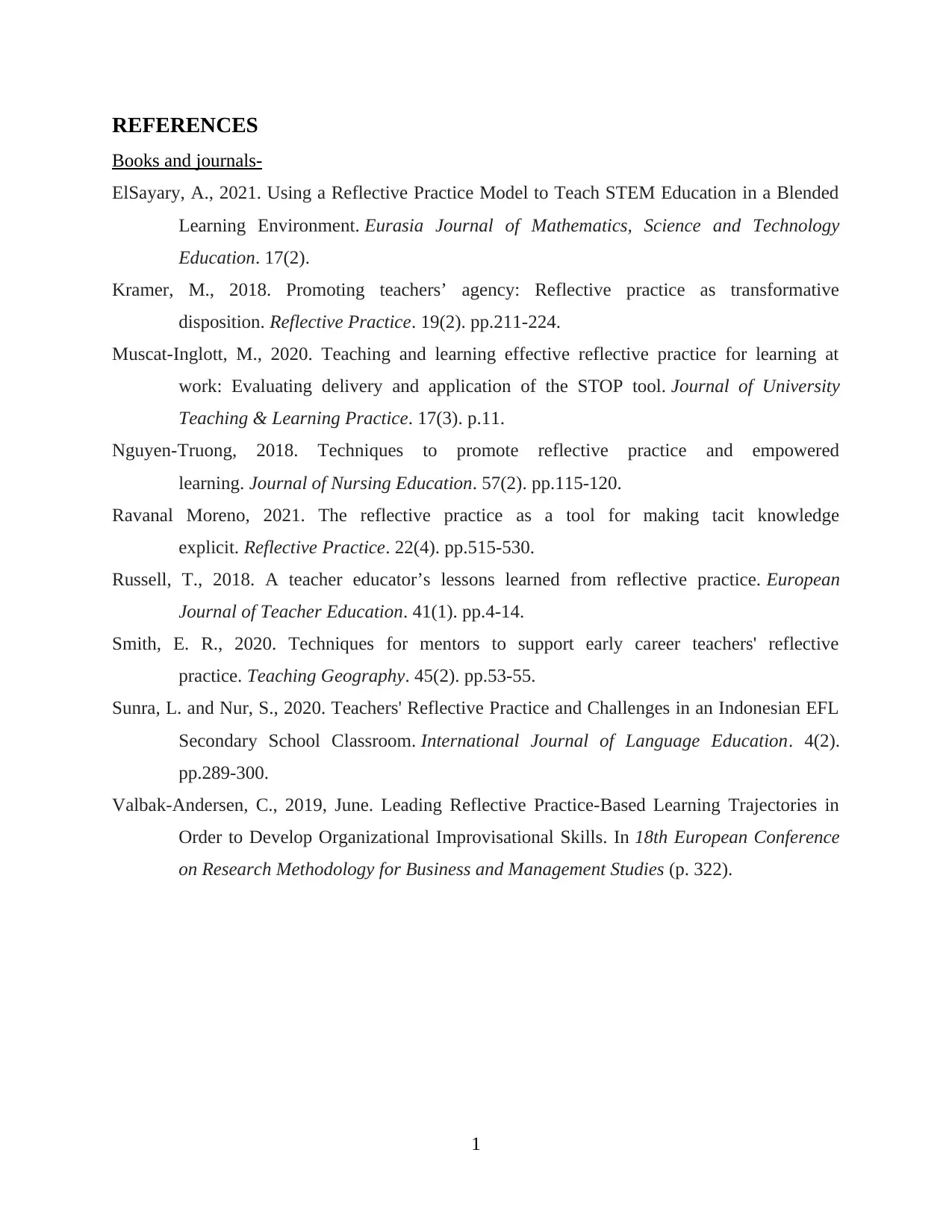
REFERENCES
Books and journals-
ElSayary, A., 2021. Using a Reflective Practice Model to Teach STEM Education in a Blended
Learning Environment. Eurasia Journal of Mathematics, Science and Technology
Education. 17(2).
Kramer, M., 2018. Promoting teachers’ agency: Reflective practice as transformative
disposition. Reflective Practice. 19(2). pp.211-224.
Muscat-Inglott, M., 2020. Teaching and learning effective reflective practice for learning at
work: Evaluating delivery and application of the STOP tool. Journal of University
Teaching & Learning Practice. 17(3). p.11.
Nguyen-Truong, 2018. Techniques to promote reflective practice and empowered
learning. Journal of Nursing Education. 57(2). pp.115-120.
Ravanal Moreno, 2021. The reflective practice as a tool for making tacit knowledge
explicit. Reflective Practice. 22(4). pp.515-530.
Russell, T., 2018. A teacher educator’s lessons learned from reflective practice. European
Journal of Teacher Education. 41(1). pp.4-14.
Smith, E. R., 2020. Techniques for mentors to support early career teachers' reflective
practice. Teaching Geography. 45(2). pp.53-55.
Sunra, L. and Nur, S., 2020. Teachers' Reflective Practice and Challenges in an Indonesian EFL
Secondary School Classroom. International Journal of Language Education. 4(2).
pp.289-300.
Valbak-Andersen, C., 2019, June. Leading Reflective Practice-Based Learning Trajectories in
Order to Develop Organizational Improvisational Skills. In 18th European Conference
on Research Methodology for Business and Management Studies (p. 322).
1
Books and journals-
ElSayary, A., 2021. Using a Reflective Practice Model to Teach STEM Education in a Blended
Learning Environment. Eurasia Journal of Mathematics, Science and Technology
Education. 17(2).
Kramer, M., 2018. Promoting teachers’ agency: Reflective practice as transformative
disposition. Reflective Practice. 19(2). pp.211-224.
Muscat-Inglott, M., 2020. Teaching and learning effective reflective practice for learning at
work: Evaluating delivery and application of the STOP tool. Journal of University
Teaching & Learning Practice. 17(3). p.11.
Nguyen-Truong, 2018. Techniques to promote reflective practice and empowered
learning. Journal of Nursing Education. 57(2). pp.115-120.
Ravanal Moreno, 2021. The reflective practice as a tool for making tacit knowledge
explicit. Reflective Practice. 22(4). pp.515-530.
Russell, T., 2018. A teacher educator’s lessons learned from reflective practice. European
Journal of Teacher Education. 41(1). pp.4-14.
Smith, E. R., 2020. Techniques for mentors to support early career teachers' reflective
practice. Teaching Geography. 45(2). pp.53-55.
Sunra, L. and Nur, S., 2020. Teachers' Reflective Practice and Challenges in an Indonesian EFL
Secondary School Classroom. International Journal of Language Education. 4(2).
pp.289-300.
Valbak-Andersen, C., 2019, June. Leading Reflective Practice-Based Learning Trajectories in
Order to Develop Organizational Improvisational Skills. In 18th European Conference
on Research Methodology for Business and Management Studies (p. 322).
1

2
⊘ This is a preview!⊘
Do you want full access?
Subscribe today to unlock all pages.

Trusted by 1+ million students worldwide
1 out of 9
Related Documents
Your All-in-One AI-Powered Toolkit for Academic Success.
+13062052269
info@desklib.com
Available 24*7 on WhatsApp / Email
![[object Object]](/_next/static/media/star-bottom.7253800d.svg)
Unlock your academic potential
Copyright © 2020–2026 A2Z Services. All Rights Reserved. Developed and managed by ZUCOL.


